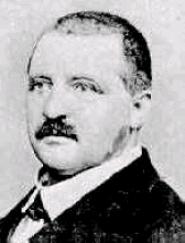music.wikisort.org - Composition
The Four Orchestral Pieces (Vier Orchesterstücke) are four short orchestral pieces, which Anton Bruckner composed in the fall of 1862 during his tuition with Otto Kitzler.
| Vier Orchesterstücke | |
|---|---|
| by Anton Bruckner | |
 The composer, c. 1860 | |
| English | Four Orchestral Pieces |
| Catalogue | WAB 96–97 |
| Composed | 12 October 1862: Linz |
| Performed | 12 October 1924: Klosterneuburg |
| Published | 1930 |
History
During the summer of 1862, when studying with Otto Kitzler in Linz, Bruckner composed his first instrumental work, the String Quartet in C minor. Thereafter, Kitzler asked him to orchestrate the opening of the first movement of Beethoven's Sonate pathétique.[1] In the fall of the same year, Bruckner tried his hand at own orchestral compositions. These "first arms" resulted in four small orchestral pieces: the Marsch (March) in D minor and the Drei Sätze für Orchester (Three Pieces for orchestra).
The original manuscript is found in the Kitzler-Studienbuch:
- Sketch and discarded first Trio for the March in D minor: pp. 251–252
- March in D minor: pp. 253–265 (dated 12 October 1862)[2]
- Three Orchestral Pieces: pp. 266–271 (undated), 272–277 (dated 10 November 1862), 278–286 (dated 16 November 1862)[3][4]
A score of the Four Orchestral Pieces was given by Bruckner to his friend Cyrill Hynais, together with that of the Overture in G minor and the Symphony in F minor. These scores are stored in the archive of the Stadt- und Landesbibliothek of Vienna.[4]
The Four Orchestral Pieces were performed first by Franz Moißl on 12 October 1924 in Klosterneuburg. A piano transcription of the March by Max Auer (1930) was put in Band III/2, pp. 29–32 of the Göllerich/Auer biography. The orchestral score of the Three Orchestral Pieces was put in Band III/2, pp. 34–60 of the Göllerich/Auer biography.[4]
The Four Orchestral Pieces are edited in Band XII/4 of the current Bruckner's Gesamtausgabe.[5]
Setting
March in D minor
The March in D minor (WAB 96) used the orchestral setting of Mozart's late symphonies (2 flutes, 2 oboes, 2 clarinets, 2 bassoons, 2 horns, 2 trumpets, timpani and strings), and three trombones.
The March is in three parts:
- March (A-BA), 26 bars, with internal repetition,
- Trio (A-B) in B-flat major, 16 bars, with internal repetition,
- Reprise of the March, followed by a 5-bar long coda.[2]
Duration: about 4 minutes.[5]
Three Pieces for orchestra
The Three Pieces for orchestra (WAB 97) are charming, melodious little movements,[6] scored for a similar orchestral setting, with only one trombone.
- Moderato in E-flat major, 36 bars - three parts: A, B, A' with coda
- Andante in E minor, 48 bars - three parts: A, B, A' with coda
- Moderato com moto in F major, 45 bars - three parts: A, B, A repeat.[3]
Total duration: about 9 minutes.[5]
The main interest of the Four Orchestral Pieces lies in the fact that with these compositions Bruckner for the first time touched upon that field which he was to make his life's work: orchestral music. The March and the central section of the final piece have some slight indications of the Bruckner to come. The March contains already a passage which recurs much later in the Eighth Symphony.[2][6]
Discography
The Four Orchestral Pieces have been recorded about ten times, mainly as addendum to the recording of a symphony. The first recording occurred in c. 1937 by Ludwig K. Mayer with the Berlin City Orchestra (78 rpm: Polydor 57213).
Some of the recordings can be downloaded from John Berky’s site.[7]
Notes
- Orchestration of the Sonate pathétique, ed. Franz Scheder
- U. Harten, pp. 271-272
- U. Harten, p. 318
- C. van Zwol, p. 678
- Anton Bruckner Critical Complete Edition – Early orchestral and instrumental works
- Hans-Hubert Schönzeler: Four Pieces and Requiem, 1970
- "Downloadable samples of the small orchestral pieces on John Berky's site". Abruckner.com. Retrieved 2014-06-30.
Sources
- Anton Bruckner, Sämtliche Werke, Kritische Gesamtausgabe – Band 11: Vier Orchesterstücke, Musikwissenschaftlicher Verlag der internationalen Bruckner-Gesellschaft, Alfred Orel (Editor), Vienna, 1934
- Anton Bruckner - Sämtliche Werke, Band XII/4: Vier Orchesterstücke (1862), Musikwissenschaftlicher Verlag der Internationalen Bruckner-Gesellschaft, Hans Jancik and Rüdiger Bornhöft (Editors), Vienna, 1996
- Anton Bruckner - Sämtliche Werke, Band XXV: Das Kitzler Studienbuch (1861-1863), facsimile, Musikwissenschaftlicher Verlag der Internationalen Bruckner-Gesellschaft, Paul Hawkshaw and Erich Wolfgang Partsch (Editors), Vienna, 2015
- August Göllerich, Anton Bruckner. Ein Lebens- und Schaffens-Bild, c. 1922 – posthumous edited by Max Auer by G. Bosse, Regensburg, 1932
- Uwe Harten, Anton Bruckner. Ein Handbuch. Residenz Verlag, Salzburg, 1996. ISBN 3-7017-1030-9.
- Cornelis van Zwol, Anton Bruckner 1824–1896 – Leven en werken, uitg. Thoth, Bussum, Netherlands, 2012. ISBN 978-90-6868-590-9
External links
- March in D minor, WAB 96: Scores at the International Music Score Library Project
- 3 Pieces for Orchestra, WAB 97: Scores at the International Music Score Library Project
- Discography of the March in D minor by John Berky
- Discography of the Three Pieces for orchestra by John Berky
- The Vier Orchesterstücke can be heard on YouTube: Marsch in d-Moll and Drei Stücke für Orchester (2018 NewYear concert for the jubilee of Ansfelden)
Другой контент может иметь иную лицензию. Перед использованием материалов сайта WikiSort.org внимательно изучите правила лицензирования конкретных элементов наполнения сайта.
WikiSort.org - проект по пересортировке и дополнению контента Википедии